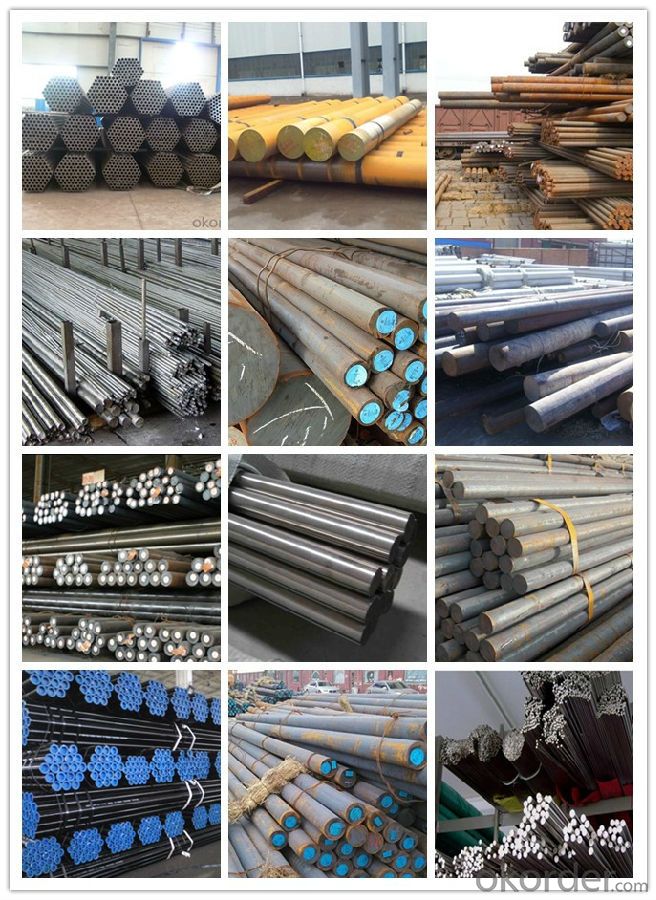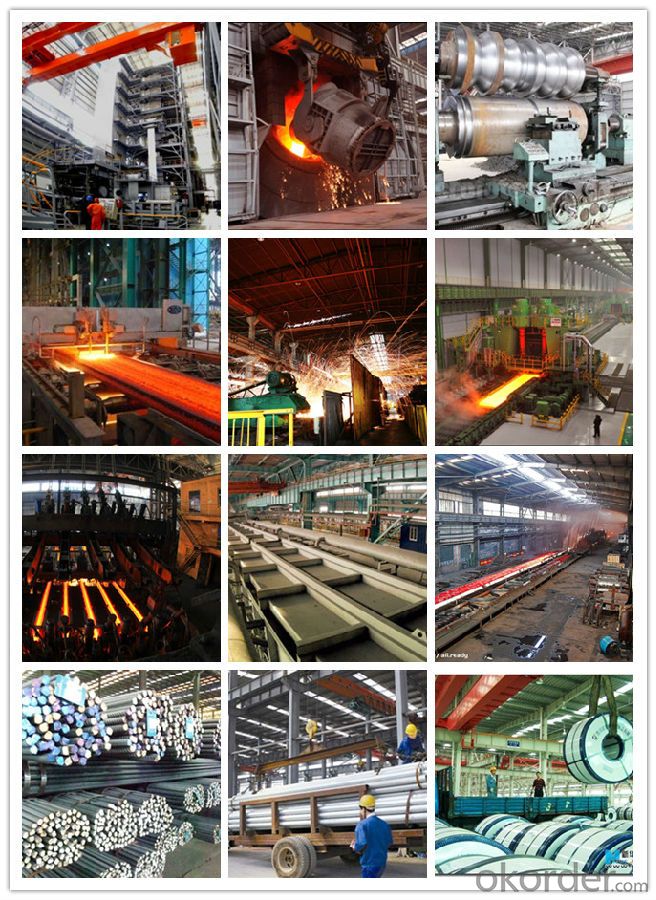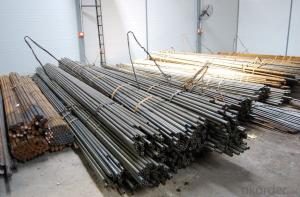Special Steel DIN 1.2365 Steel Round Bar
- Loading Port:
- China main port
- Payment Terms:
- TT OR LC
- Min Order Qty:
- 30 m.t.
- Supply Capability:
- 10000 m.t./month
OKorder Service Pledge
OKorder Financial Service
You Might Also Like
Item specifice
Specifications
1.2365 steel round bars
1.Diameter:10mm~600mm,
2.Delivery Conditon:annealed, black/turned surface
3.Short Delivery Time
Product information
| 1.2365 steel round bars | |||||||
| Chemical Composition(%) | |||||||
| C | Si | Mn | P | S | Cr | Mo | V |
| 0.28-0.35 | 0.10-0.40 | 0.15-0.45 | ≤0.030 | ≤0.030 | 2.70-3.20 | 2.60-3.00 | 0.40-0.70 |
| Specialty | |||||||
| 1.Excellent machinability, easy to be processed, shorten the time of making molds. | |||||||
| 2. No need to be hardened after processing, free from quenching deformation, cracks and telescopic | |||||||
| 3.High resistance of thermal cracking, good strength in high temperature, long-life of molds. | |||||||
| Use | |||||||
| 1.Light alloy pressure forming; steel forging forming the mold; extrusion die; heavy alloy production of iron as well as guide sleeve | |||||||
| 2. Pressure forming die mold; die casting mold (upper die and lower die inserts, thimble and sleeve cold punching, hot shear and wear parts. | |||||||
| 3. Extrusion die (die, the die pad, the extruder barrel, punch); aluminum, copper, magnesium and the hot forming die; plastic | |||||||
| Heat Treatment | |||||||
| 1. Quench:1030-1060°c by oil or wind cooling | |||||||
| 2. Tempering:600~700 °c | |||||||
| Melting Process | |||||||
| 1. EAF: Electric Furnace+LF+VD(Optional) | |||||||
| 2. ESR: Electric Furnace+LF+VD+Eleroslag Remelted(Optional) | |||||||
| UT Class | |||||||
| According to Standard of SEP 1921/84,100% Volume, Level C/c, D/d or E/e | |||||||
| Tolerance on Quantity | |||||||
| +/-10% Per Size | |||||||
Product show

Workshop show

Shipping
1. FedEx/DHL/UPS/TNT for samples, Door-to-Door;
2. By Air or by Sea for batch goods, for FCL; Airport/ Port receiving;
3. Customers specifying freight forwarders or negotiable shipping methods!
Delivery Time: 3-7 days for samples; 5-25 days for batch goods.
Payment Terms
1.Payment: T/T, L/C, Western Union, MoneyGram,PayPal; 30% deposits; 70% balance before delivery.
2.MOQ: 1pcs
3.Warranty : 3 years
4.Package Informations: 1) EXPORT, In 20 feet (GW 25 ton) or 40 feet Container (GW 25 ton)
2)as customer's requirement
Why choose us?
(1) The leading exporter in China special steel industry.
(2) Large stocks for various sizes, fast delivery date.
(3) Good business relationship with China famous factories.
(4) More than 7 years steel exporting experience.
(5) Good after-sales service guarantee.
- Q:Can special steel be used for electrical applications?
- Yes, special steel can be used for electrical applications. Special steel alloys, such as stainless steel or electrical-grade steels, are often used in electrical applications due to their excellent electrical conductivity, resistance to corrosion, and high strength properties. These steels are commonly utilized in the manufacturing of electrical components, wiring, transformers, and various electrical equipment.
- Q:How does special steel contribute to reducing product recalls?
- Special steel contributes to reducing product recalls by providing improved strength, durability, and resistance to wear and tear. By using special steel in manufacturing processes, products are less likely to experience structural failures, malfunctions, or breakages that could lead to safety hazards or performance issues. This ultimately enhances the overall quality and reliability of products, minimizing the chances of recalls due to material-related defects.
- Q:How is special steel recycled or disposed of?
- Special steel, also known as alloy steel, is a valuable and highly sought-after material due to its unique properties and applications. When it comes to recycling or disposing of special steel, several methods can be employed depending on the condition and quality of the material. Recycling is the preferred and most common method for dealing with special steel. The recycling process involves collecting, sorting, and melting down the steel scrap to be reused in the production of new steel products. This process helps conserve natural resources, reduce energy consumption, and minimize waste generation. The first step in recycling special steel is the collection of scrap or end-of-life products that contain this material. These sources can include discarded machinery, automotive parts, construction materials, and even old appliances. Once collected, the steel is sorted and separated from other materials, such as plastic, rubber, or non-ferrous metals, using various techniques like magnetic separation, eddy current separation, or manual sorting. After sorting, the steel scrap is sent to a specialized recycling facility, commonly known as a steel mill or foundry. Here, the scrap is melted down in large furnaces at extremely high temperatures. During this process, impurities and contaminants are removed, and alloying elements can be added to achieve the desired composition and properties of the steel. Once the steel has been melted and purified, it is cast into various forms such as ingots, billets, or slabs, which can then be used to manufacture new steel products. These products may include pipes, bars, plates, or even new machine parts, depending on the specific requirements of the industry. As for disposal, special steel should be considered a valuable resource and not simply thrown away as waste. However, in cases where the steel is damaged beyond repair or contains hazardous materials, proper disposal methods must be followed. This typically involves consulting with specialized waste management companies that can handle the safe and environmentally friendly disposal of such materials. In conclusion, special steel is primarily recycled due to its high value and the various benefits associated with recycling. Through the collection, sorting, and melting processes, special steel can be transformed into new products while conserving resources and minimizing waste. Proper disposal methods are only necessary in exceptional cases where recycling is not feasible or when dealing with damaged or hazardous materials.
- Q:How is special steel used in the packaging industry?
- Special steel is used in the packaging industry for a variety of applications such as manufacturing durable and corrosion-resistant containers, packaging machinery, and tools used in the packaging process. It provides strength, reliability, and longevity, ensuring the safety and protection of products during storage and transportation.
- Q:Can special steel be used in the production of luxury goods?
- Certainly, luxury goods can certainly benefit from the use of special steel in their production. High-quality materials are often necessary to ensure the durability, exclusivity, and overall premium quality of luxury items. Special steels, such as stainless steel, alloy steel, or carbon steel, possess a variety of desirable properties that make them suitable for manufacturing luxury goods. For example, stainless steel is commonly utilized in the creation of luxury watches, jewelry, and accessories because of its resistance to corrosion, shiny appearance, and ability to endure daily wear and tear. Furthermore, certain alloy steels offer exceptional strength and toughness, making them perfect for luxury car components, high-end knives, or designer furniture. Incorporating special steel into luxury goods not only enhances their aesthetic appeal but also contributes to their longevity and value. These materials can be skillfully fashioned into intricate designs, enabling manufacturers to produce unique and exceptional products that cater to the discerning preferences of luxury consumers. All in all, special steel possesses a wide range of qualities that are highly sought after in the production of luxury goods, making it the preferred choice among designers and manufacturers in this industry.
- Q:What are the different types of coatings for special steel?
- To enhance the performance and safeguard special steel against various environmental factors, a range of coatings can be applied. The following are some commonly used coatings for special steel: 1. Zinc-based coatings: These coatings, like galvanized steel, offer exceptional corrosion resistance. By acting as sacrificial barriers, the zinc layers protect the underlying steel from rusting. 2. Epoxy coatings: Renowned for their resistance to chemicals, moisture, and abrasion, epoxy coatings find extensive use in industries where steel is exposed to harsh conditions or corrosive substances. 3. Powder coatings: Providing a durable and visually appealing finish to special steel, powder coatings are applied as dry powder and cured under heat. This process forms a tough, protective layer that resists chipping, fading, and corrosion. 4. Ceramic coatings: Ceramic coatings are celebrated for their ability to withstand high temperatures and excellent thermal insulation properties. They are commonly utilized in applications involving extreme heat or rapid temperature changes. 5. Organic coatings: Acrylics and polyurethanes are examples of organic coatings that create a protective barrier against moisture, UV radiation, and chemicals. They are frequently employed in outdoor applications, such as architectural structures or automotive parts. 6. Phosphate coatings: Primarily used as pre-treatment before applying other coatings or paints, phosphate coatings enhance adhesion and corrosion resistance in subsequent layers, resulting in a more durable finish. 7. Polymer coatings: Polymer coatings exhibit exceptional resistance to abrasion, impact, and chemicals. They are often utilized in industrial settings where steel experiences heavy wear and tear. Selecting the appropriate coating for special steel is crucial, considering the specific requirements and environmental conditions it will encounter. Each type of coating possesses its own advantages and limitations, necessitating a comprehensive analysis to determine the most suitable option.
- Q:How does special steel perform in high-temperature strength?
- Special steel performs well in high-temperature strength due to its unique composition and properties. It is specifically designed to withstand and maintain its mechanical strength and structural integrity at elevated temperatures. This is achieved through the careful selection of alloying elements, heat treatment processes, and precise control of microstructure. Special steel exhibits excellent resistance to deformation, creep, and oxidation, making it a preferred choice for applications that involve high temperatures, such as in power generation, aerospace, and industrial processing.
- Q:What are the main applications of special steel in the packaging industry?
- Special steel has a wide range of applications in the packaging industry, primarily due to its exceptional strength, durability, and corrosion resistance. It is commonly used in the manufacturing of packaging machinery, such as conveyor systems, filling machines, and cutting tools, ensuring efficient and precise operations. Additionally, special steel is often employed in the production of packaging materials, including cans, containers, and closures, providing enhanced protection and preservation of goods.
- Q:What are the specific requirements for special steel used in the marine shafting industry?
- The specific requirements for special steel used in the marine shafting industry are as follows: 1. Corrosion Resistance: Special steel used in marine shafting must have high resistance to corrosion due to the harsh conditions encountered in marine environments. It should be able to withstand constant exposure to saltwater, humidity, and other corrosive elements without deterioration. 2. Strength and Toughness: Marine shafting steel should possess high strength and toughness to withstand the heavy loads and vibrations experienced in marine operations. It should be able to withstand the continuous stress and dynamic loads without failure or deformation. 3. Fatigue Resistance: The steel used in marine shafting should have excellent fatigue resistance to withstand the cyclical loading experienced during operation. It should be able to endure millions of load cycles without developing cracks or fractures. 4. Dimensional Stability: Special steel used in marine shafting must exhibit dimensional stability to ensure precise alignment and fit within the machinery. It should have minimal dimensional changes under varying temperature and humidity conditions to maintain the integrity of the shaft system. 5. Machinability: It is essential for the steel used in marine shafting to be easily machinable to create complex shapes, such as propeller shafts and couplings. This allows for efficient manufacturing and maintenance of the shafting components. 6. Non-Magnetic Properties: Special steel used in marine shafting must possess low magnetic permeability to avoid interference with sensitive navigation and communication equipment. Non-magnetic properties minimize the risk of compass errors and electromagnetic interference. 7. Certification and Compliance: The steel used in marine shafting should meet specific industry standards and certifications, such as those set by classification societies like the American Bureau of Shipping (ABS) or the International Association of Classification Societies (IACS). These certifications ensure the steel's quality, performance, and adherence to safety regulations. Meeting these specific requirements ensures that the special steel used in marine shafting provides reliable performance, durability, and safety in marine applications.
- Q:What are the different standards and specifications for special steel?
- Special steel production and usage is governed by a variety of standards and specifications. These guidelines guarantee that the steel satisfies specific requirements and performance criteria for different purposes. Some of the commonly used standards and specifications for special steel are as follows: 1. AISI/SAE standards: Developed by the American Iron and Steel Institute (AISI) and the Society of Automotive Engineers (SAE), these standards classify special steel types based on their chemical composition and mechanical properties. They are widely used across various industries. 2. ASTM standards: The American Society for Testing and Materials (ASTM) provides standards for special steel materials in construction, manufacturing, and engineering applications. These standards define chemical composition, mechanical properties, and other necessary characteristics for specific grades of special steel. 3. EN standards: The European Committee for Standardization (CEN) has established the European Norm (EN) standards for steel products. Covering a wide range of steel grades, these standards specify chemical composition, mechanical properties, and testing procedures required for different types of special steel. 4. JIS standards: The Japanese Industrial Standards (JIS) outline the requirements for various types of steel used in Japan, including special steel. They provide guidelines for chemical composition, mechanical properties, and other quality parameters. 5. ISO standards: The International Organization for Standardization (ISO) has developed standards for steel materials used globally in different industries. These standards ensure compatibility and interchangeability of steel products by defining dimensions, tolerances, and performance requirements. 6. MIL-SPEC standards: The United States Department of Defense (DoD) has created military specifications (MIL-SPEC) for special steel used in defense applications. These standards define the requirements for special steel used in military equipment, weapons, and vehicles to ensure reliability and performance under harsh conditions. 7. API standards: The American Petroleum Institute (API) provides standards for special steel utilized in the oil and gas industry. These standards specify materials, dimensions, and other requirements for steel pipes, fittings, and equipment used in oil and gas exploration, production, and transportation. These examples represent only a fraction of the numerous standards and specifications available for special steel. Manufacturers and industries must comply with these standards to guarantee the quality, performance, and safety of special steel products in different applications.
1. Manufacturer Overview |
|
|---|---|
| Location | |
| Year Established | |
| Annual Output Value | |
| Main Markets | |
| Company Certifications | |
2. Manufacturer Certificates |
|
|---|---|
| a) Certification Name | |
| Range | |
| Reference | |
| Validity Period | |
3. Manufacturer Capability |
|
|---|---|
| a)Trade Capacity | |
| Nearest Port | |
| Export Percentage | |
| No.of Employees in Trade Department | |
| Language Spoken: | |
| b)Factory Information | |
| Factory Size: | |
| No. of Production Lines | |
| Contract Manufacturing | |
| Product Price Range | |
Send your message to us
Special Steel DIN 1.2365 Steel Round Bar
- Loading Port:
- China main port
- Payment Terms:
- TT OR LC
- Min Order Qty:
- 30 m.t.
- Supply Capability:
- 10000 m.t./month
OKorder Service Pledge
OKorder Financial Service
Similar products
New products
Hot products
Related keywords






























